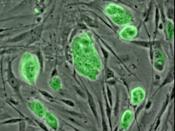What are stem cells and why should we continue studying them? Stem cells are the source of life. They bridge the gap from the embryo we start out as and the architecture we become. Stem cell research has been ongoing for more then twenty years. The more we study them the more potential we find. But with every new scientific discovery there is always controversy and stem cells are no different. The controversy arises due to the source of stem cells. Some scientist believe that stem cells from human embryos have a greater potential to produce results then cells from adult donors or umbilical cord blood. But no matter where we get them the benefits far out way the controversies.
Stem cells are blank cells that can develop into virtually any kind of cell in the human body. Most cells have a specific function such as liver cells, skin cells, brain cells and so forth, and once they have taken on this function, in a process called differentiation, they can't be adapted for any other function.
Stem cells, however, have not gone through the differentiation process. By isolating stem cells in a laboratory, scientists theoretically could grow new heart cells to repair damage from heart attacks, new liver cells to treat hepatitis and new red blood cells for cancer patients. According to the lead researchers, stem cells could potentially be used for such things as growing nerve cells to repair spinal injuries, or even growing cells that make insulin, creating a treatment for diabetes. They also have the potential to make blood cells genetically altered to resist specific disease, such as HIV, to replace diseased blood cells. Stem cells have tremendous potential in regenerative medicine, which is the concept of repairing or regrowing damaged organs and tissue.
Recently, scientists have...



Good
A short descriptive and informative essay.
0 out of 0 people found this comment useful.